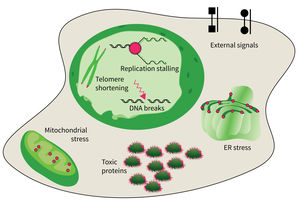Subarea 4: Cell Dynamics and Molecular Damages in Aging
The research focus of Subarea 4 is on studying damages of macromolecules (proteins, nucleic acids) and determining the structure-function relationship of biomolecules relevant to damage and damage repair processes and responses to molecular damage that might lead to aging and aging-associated pathologies.
The studies are focused on the following research areas: DNA replication, DNA damage responses (DDR), stress responses, metabolic stresses, protein trafficking and protein damages.
The research is defined by four focus areas:
- DNA damage response in tissue homeostasis and neuropathies,
- Quality control in the endoplasmic reticulum for secretory pathway in aging processes,
- Intrinsic and extrinsic factors implicated in cellular decline during aging, and
- DNA replication and genomic integrity preventing premature aging and diseases.
Research focus of Subarea 4.
The accumulation of damaged macromolecules or subcellular organelles is associated with dysfunction of a cell, which contributes to tissue & organ failure. DNA damage, genomic instability, protein misfolding or defects in toxic protein degradation can compromise cell functionality. Alterations of mitochondrial DNA and protein complexes affect cellular metabolism, which will have a general impact on cell integrity.
Publications
(since 2016)
2024
- Reducing the metabolic burden of rRNA synthesis promotes healthy longevity in Caenorhabditis elegans.
Sharifi* S, Chaudhari* P, Martirosyan A, Eberhardt AO, Witt F, Gollowitzer A, Lange L, Woitzat Y, Okoli EM, Li H, Rahnis N, Kirkpatrick J, Werz O, Ori A, Koeberle A, Bierhoff** H, Ermolaeva** M
Nat Commun 2024, 15(1), 1702 * equal contribution, ** co-corresponding authors - Fe-S cluster biosynthesis in chromatin protects genome stability and promotes DNA replication
Shi R
Dissertation 2024, Jena, Germany - Repopulated microglia after pharmacological depletion decrease dendritic spine density in adult mouse brain.
Wickel J, Chung HY, Ceanga M, von Stackelberg N, Hahn N, Candemir Ö, Baade-Büttner C, Mein N, Tomasini P, Woldeyesus DM, Andreas N, Baumgarten P, Koch P, Groth M, Wang ZQ, Geis C
Glia 2024 (epub ahead of print) - Role of UFMylation and Ubiquitylation of MCM7 during DNA replication
Yuan S
Dissertation 2024, Jena, Germany
2023
- Targeting cellular pathways in hyper- and ultramutated cancer cells with exonuclease-defective DNA polymerase epsilon
Borges G
Dissertation 2023, Jena, Germany - UPF3A is dispensable for nonsense-mediated mRNA decay in mouse pluripotent and somatic cells.
Chen C, Shen Y, Li L, Ren Y, Wang ZQ, Li T
Life Sci Alliance 2023, 6(6), e202201589. doi: 10.26508/lsa.20 - Triac Treatment Prevents Neurodevelopmental and Locomotor Impairments in Thyroid Hormone Transporter Mct8/Oatp1c1 Deficient Mice.
Chen J, Salveridou E, Liebmann L, Sundaram SM, Doycheva D, Markova B, Hübner CA, Boelen A, Visser WE, Heuer H, Mayerl S
Int J Mol Sci 2023, 24(4), 3452 - Microglia mediate neurocognitive deficits by eliminating C1q-tagged synapses in sepsis-associated encephalopathy.
Chung HY, Wickel J, Hahn N, Mein N, Schwarzbrunn M, Koch P, Ceanga M, Haselmann H, Baade-Büttner C, von Stackelberg N, Hempel N, Schmidl L, Groth M, Andreas N, Götze J, Coldewey SM, Bauer M, Mawrin C, Dargvainiene J, Leypoldt F, Steinke S, Wang ZQ, Hust M, Geis C
Sci Adv 2023, 9(21), eabq7806 - A YIPF5-GOT1A/B complex directs a transcription-independent function of ATF6 in ER export
Cramer P, Yonemura Y, Behrendt L, Marszalek A, Sannai M, Durso W, Günes C, Szafranski K, Nakamura N, Nasrashvili T, Mayer J, von Eyss** B, Kaether** C
bioRxiv 2023, 10.1101/2023.12.12.569033 ** co-corresponding authors - Editorial: Guardians of protein homeostasis (proteostasis) in health, disease and aging.
Dougan** DA, Truscott** KN, Kirstein** J
Front Mol Biosci 2023, 10, 1350666 ** co-corresponding authors









